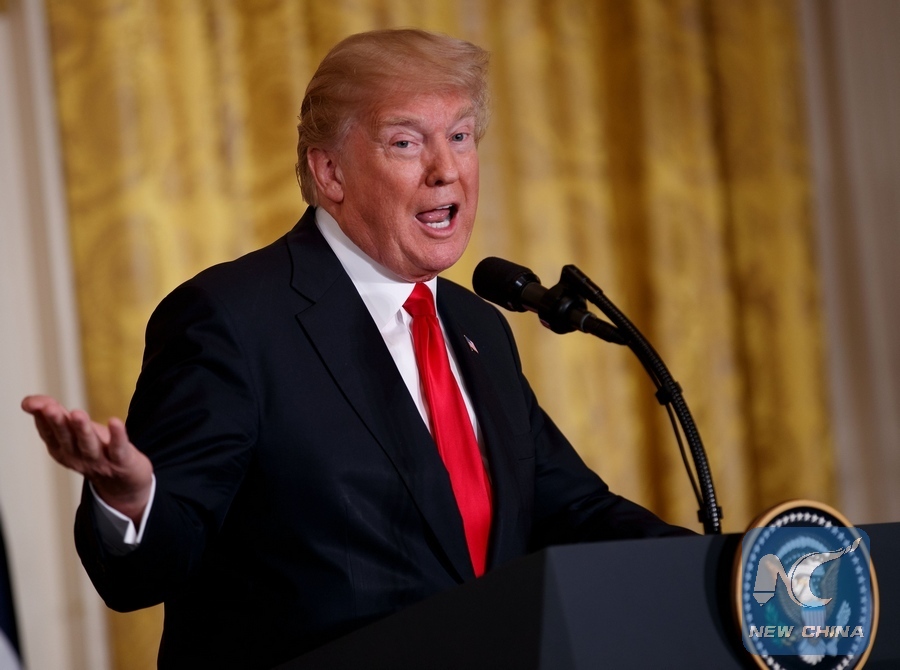Trump's unfortunate comments: A bit of context
- By Jesse Anderson
 0 Comment(s)
0 Comment(s) Print
Print E-mail China.org.cn, January 17, 2018
E-mail China.org.cn, January 17, 2018
Without question, it was one of the most (if not the most) problematic things Trump has said since he became President: According to other people who were in attendance at a bipartisan meeting on immigration, Trump called a group of countries (more specifics below) as "sh*tholes" and, in reference to Haitian immigrants, said, "Get them out."

Following reports of the alleged remarks, Trump has been widely condemned as racist and various countries have even summoned American ambassadors to explain the President's behavior. The issue has in some ways acted as a temporary national unifier, with both Republicans and Democrats speaking out against Trump's behavior. But although it might seem like a cut and dried matter, it has several layers that are worth looking into.
For one thing, not everyone present at the meeting agrees on the details of what happened. Two Republican Senators – David Perdue and Tom Cotton – have vehemently claimed that Trump didn't use the word "sh*thhole" and that his comments are being misrepresented. Also, Homeland Security Secretary Kirstjen Nielsen has said that she doesn't remember Trump using "that exact phrase."
But should we believe them? Trump's comment was originally reported by Democratic Senator Dick Durbin, and if he was the only person making the accusation it might be reasonable to question his motives. But Republican Senator Lindsey Graham has also reportedly stated the Durbin's claims were "basically accurate" and made public comments that suggest he heard the same things that Durbin did.
Furthermore, it's not at all difficult to imagine Trump saying this kind of thing. Michael Wolff's statement at the beginning of Fire and Fury, which covers the early days of the Trump administration, that "if it rings true, it is true" may have been a dubious assertion for an entire book, but in this case its application seems more than justified.
Next, the remark's context needs to be examined. What countries exactly did Trump refer to as "sh*tholes?" In the beginning some people were under the impression that Trump had used the word when discussing El Salvador and Haiti, but it now appears that he was in fact speaking broadly about African countries (the African Union has subsequently denounced Trump's comment and demanded a retraction and an apology). Trump did discuss Haiti in less than flattering terms, as mentioned above, but it seems that his statements regarding the Caribbean state were separate from those relating to Africa.
And so the real question is: How should we judge what Trump said? There is no question, and many people far to the Right won't even deny this, that Trump's word choice was deeply unfortunate and unbecoming of a world leader. Where there is debate, however, is whether or not the remarks demonstrate that Trump is a racist. Those on the Left point to the fact that after calling majority black countries "sh*tholes," he suggested that the U.S. bring in more migrants from Norway, a majority white country. They also have brought up previous – though mostly unsubstantiated – reports of Trump denigrating black countries. Meanwhile, some conservative commentators have claimed that liberals are denying a basic fact, which is: Some countries are indeed bad places to live, and though Trump could have used a friendlier word to say it, he was only speaking the truth.
This, like many debates surrounding Trump, will likely remain unresolved and only serve to push Left and Right further apart.
Finally, it's worth looking at why Trump was talking about these countries in the first place. Since Trump repealed DACA (the Deferred Action for Childhood Arrivals program), Republicans have been trying to use the possibility of its reinstatement as leverage to get the Democrats to agree to toughen up American immigration policy. One thing Republicans would like to see is the end of the Diversity Lottery Program, which brings in randomly selected immigrants from countries that are currently underrepresented in the U.S. This is likely what Trump was talking about when he made his comments about African countries.
As for what he said about Haiti, he was probably referring to the Temporary Protected Status given to tens of thousands of Haitians after the country's devastating earthquake in 2010. Temporary Protected Status is granted to people the U.S. regards as living in dangerous conditions and, as the name implies, is meant to be "temporary" – this being Trump's argument for forcing the Haitians to go back home.
The full effects of Trump's comments have yet to be seen. But there's no doubt that the U.S.'s image, at least for now, has suffered a large blow because of them. If nothing else comes out of all this, however, we will at least have gotten further evidence of Trump's poor character and judgment.
Jesse Anderson is a writer and translator originally from Seattle. He is currently based in Mexico City.
Opinion articles reflect the views of their authors, not necessarily those of China.org.cn.






Go to Forum >>0 Comment(s)